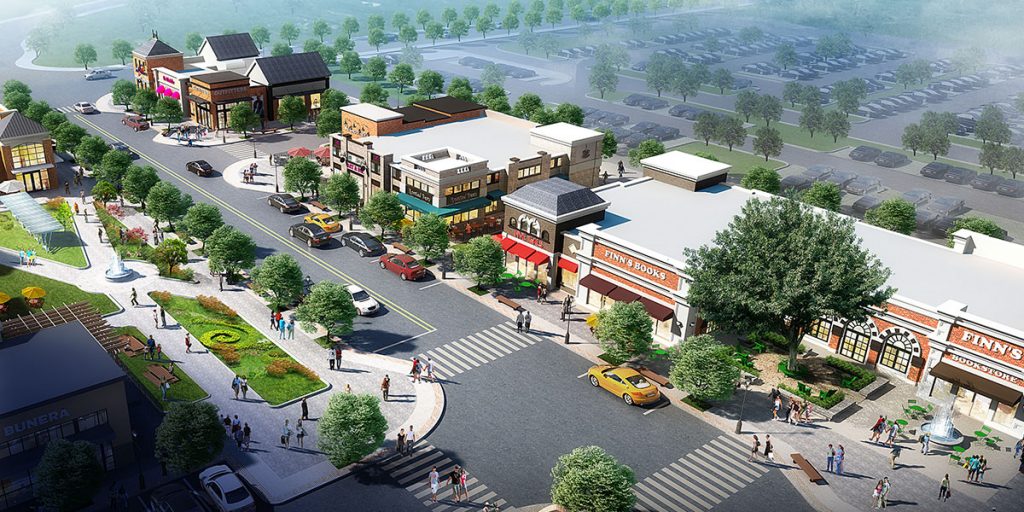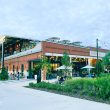How redevelopment revitalizes a community
Many cities across the nation are burdened with empty storefronts, unusable infrastructure and remnants of previous prosperity. These structures often lay dormant for long periods of time—ignored, overlooked and undervalued. Cities that redevelop existing structures and transform dormant property into recreational and functional business environments find that their investments spark innovation and unlock a world of potential. When a region welcomes and supports a range of diverse businesses, economic growth follows which can transform an area into a well-rounded community by increasing its overall regional value. Redeveloping infrastructure enables cities to attract their target industries, build diversity through business offerings and instill a sense of meaning in their community members through public opinion.
Attracting key industries and targeting community needs
Existing structures across a city or region can readily transform into adaptive reuse spaces, which in turn can accommodate a range of business types across different industries from logistics and manufacturing to cultural arts projects and retail storefronts.
Every community has a handful of target industries it wants to attract, and the vision of reuse projects can encourage a city to evaluate which types of businesses or industries it wants to recruit. Existing structures can transform into business parks, facilities and new storefronts that are well-suited for a variety of industries.
The iPark 84 campus in Dutchess County, N.Y., is a great example of this concept. The 2-million-square-foot campus evolved from a former IBM manufacturing facility to an adaptive mixed-use space. By constructing spaces primed for tractor trailer loading, iPark 84 attracted several companies in our community’s target industries including food and beverage manufacturing, logistics and advanced manufacturing.
The same rings true for local businesses—Sloop Brewing Co. relocated to the iPark 84 campus in 2018 and has since increased production by more than 250 percent. Seeing the company’s success, several others in the food and beverage industry followed suit, eager to relocate to larger spaces and expand their business offerings; this healthy balance of business communities helps to support a diverse population of visitors and residents.
Having clusters of companies in the region also attracts like-minded businesses, helping to spark innovation in the region and in turn, attracting more investment. In 2020, Amazon announced plans to construct a $544 million logistics and receiving center in Dutchess County. The following year, Frito-Lay signed a deal announcing a new $100 million logistics center minutes from the Amazon property.
Building diversity through business offerings
While you may be tempted to focus specifically on businesses within your targeted industries, it is imperative to consider the importance of cultivating a diverse business community. Businesses that find your region attractive can come from a diverse group of industry types and establishment sizes. A holistic community provides something for everyone—from housing and apartment rentals to restaurant and retail accommodations, warehouse space, manufacturing facilities and more.
Mixed-use redevelopment projects are an ideal way to cater to diverse populations. One of the most popular examples of this in Dutchess County is the Poughkeepsie Underwear Factory, a thriving community hub centered around a factory built in 1874 that now features more than 30 small food and beverage businesses, private art studios, co-working spaces, apartments and more.
The Hudson Heritage community is also a redevelopment project that sprouted from a former New York State-owned health facility. Today, the site is actively developing residential units, a hotel, medical facility, performing arts center, a retail shopping village and connections walking and biking trails, combining live, work and play elements all in one space.
Instilling a sense of meaning in community members
Many development approval processes take public opinion into consideration. After all, these projects are meant to support and be utilized by the communities in which they surround. Extending a line of communication to your residents instills a sense of meaning in them, as they feel their leaders and public officials hear them and want to make changes that will address immediate community needs.
In the approval process for the Youth Opportunity Union (YOU) project, we are seeking public input on the design of the building, which is set to begin construction in 2023. This call-to-action allows us to learn of considerations that should be included to better accommodate our community, such as accessibility elements for those with sensory, motor or learning deficiencies. We want to ensure this redevelopment project is properly equipped with all the necessary tools needed to educate and support Dutchess County’s youth population.
We develop a sense of belonging within our community by asking for residential input. Ultimately, this leads to a sense of trust with local leadership—when the public know their voices are acknowledged, they trust that local leadership will make sound decisions based on what is best for the community. The happier and more trusting your residents are with decision makers, the higher your region’s quality of life will be. A unified community strives to support and uplift one another.
Utilizing redevelopments can help to generate business retention and expansion, economic wealth and community morale, giving communities a sense of identity and purpose. When you establish opportunities that can accommodate a range of businesses and welcome the input of residents, you build a better, more supportive community for everyone.
With more than 10 years of economic development experience, Sarah Lee has served as the CEO of Think Dutchess Alliance for Business since 2015. She oversees administration resource management, organization linkages and staff supervision of Think Dutchess and its departments, including business attraction, business retention and expansion and marketing as it relates to economic development. She also serves as the executive director of the Dutchess County Industrial Development Agency.




















